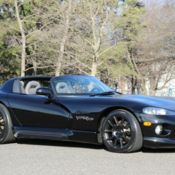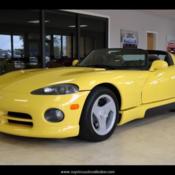Description
**. ** First generation Viper RT/10 Production 1992–1995 Designer Tom Gale (1990) Body and chassis Body style 2-door roadster Powertrain Engine 8.0 L (488.1 cu in) V10 400 bhp (298 kW) 465 lb·ft (630 N·m) Transmission 6-speed manual Dimensions Wheelbase 96.2 in (2,440 mm) Length 175.1 in (4,450 mm) Width 75.7 in (1,920 mm) Height 44.0 in (1,120 mm) Curb weight 3,284 lb (1,490 kg) The first prototype was tested in January 1989. It debuted in 1991 with two pre-production models as the pace car for the Indianapolis 500 when Dodge was forced to substitute it in place of the Japanese-built Stealth because of complaints from the United Auto Workers, nd went on sale in January 1992 as the RT/10 Roadster. The centerpiece of the car was its engine. It was based on the Chrysler LA design, hich was mostly used as a truck engine at the time. The original configuration made it too heavy for sports car use, o Lamborghini, hen owned by Chrysler Corporation, evamped Dodge's cast-iron block V10 for the Viper by recasting the block and heads in aluminum alloy. Some within Chrysler felt the pushrod two-valve design, hile adequate for the truck application, as unsuitable for a performance car and suggested a more comprehensive redesign which would have included four valves per cylinder. Chrysler, owever, as uncertain about the Viper's production costs and sales potential and so declined to provide the budget for the modification. The engine weighed 711 lb (323 kg) and produced 400 bhp (300 kW) at 4600 rpm and 465 lb·ft (630 N·m) at 3600 rpm, nd thanks to the long-gearing allowed by the engine, rovided fuel economy at a United States Environmental Protection Agency-rated 12 mpg-US (20 L/100 km; 14 mpg-imp) city and 20 mpg-US (12 L/100 km; 24 mpg-imp) highway.[7] The body was a tubular steel frame with resin transfer molding (RTM) fiberglass panels. Some small bits of the suspension, tie-rod ends and parts of the front wheel hubs) following the manufacturer's "engine first" mantra, ere sourced from the Dodge Dakota pickup. It had a curb weight of 3,284 lb (1,490 kg) and lacked all modern driver aids such as traction control or anti-lock brakes. Car and Driver magazine referred to this generation as "the world's biggest Fat Boy Harley", nd likened driving it to "playing ping pong with a Louisville Slugger baseball bat." Despite this, n straight line performance, t completed a quarter mile (402 m) in 12.6 seconds and had a maximum speed of over 150 mph (240 km/h). Its large tires allowed the car to average close to 1 lateral g in corners, lacing it among the elite cars of its day. However, he car proved tricky to drive at high speeds, articularly for the unskilled. The car was spartan, lthough it featured inflatable lumbar support and adjustable seats. Along with the absence of exterior door handles, he vehicle lacked side windows and a roof. Although a soft top cover was available, t was designed primarily for indoor vehicle storage. Side curtains of fabric and clear plastic operated by zippers could be inserted into the door and hand-bolted when needed. All of these decisions were made to reduce weight. The battery is located in the sealed compartment over the rear wheels to increase rear-end weight and traction. The car shipped with a tonneau cover and video tape on soft-top assembly (the soft top is removable and folds to fit in the trunk). In 1994 A/C was added as an option. Performance[edit] 0-60 mph (97 km/h): 4.5 sec [8] 0-100 mph (160 km/h): 9.2 sec quarter mile: 12.9 sec @ 113.8 mph (183.1 km/h)[8] top speed: 180 mph (290 km/h) 700 ft (210 m) slalom: over 66 mph (106 km/h) skidpad average g: 0.96 Shipping and financing available www.GulfCoastMotorWorks.com 239-405-7253 Fees and Taxes: $399.00 Doc Fee on all Purchases. Out of state buyers are responsible for all state, ounty, ity taxes and fees, s well as title/registration fees in the state that the vehicle will be registered.

